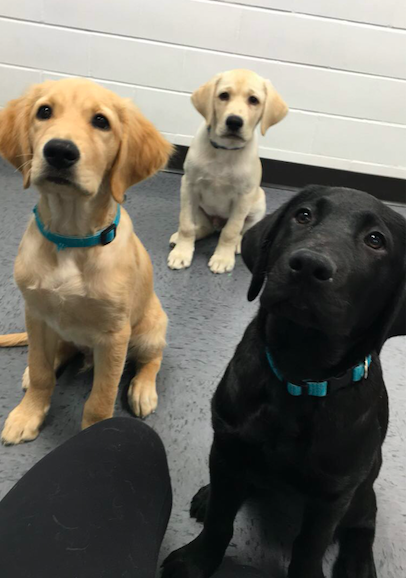Emily Bray, Ph.D., might have the best job ever. Since earning her bachelor’s at Duke in 2012, she has been researching cognitive development in puppies, which basically means she’s spent the last seven years playing with dogs. If that’s not success, I don’t know what is.
Last Friday marked the 10th birthday of Duke’s Canine Cognition Center, and the 210th birthday of Charles Darwin. To celebrate, Brian Hare, Ph.D., invited former student Bray back to campus to share her latest research with a new generation of Duke undergraduates. The room was riveted — both by her compelling findings and by the darling photos of labs and golden retrievers that accompanied each slide.

During her Ph.D. program at the University of Pennsylvania, Bray worked with Robert Seyfarth, Dorothy Cheney, and James Serpell to investigate the effects of mothering on puppy development. For her dissertation, she studied a population of dog moms and their puppies at The Seeing Eye, Inc. The Seeing Eye is one of the oldest and largest guide dog schools in the U.S. They have been successfully raising and training service dogs for the blind since 1929, but like most things, it is still an imperfect science. Approximately half of the puppies bred at The Seeing Eye fail out of program. A dog that completes service training at The Seeing Eye represents two years of intensive training and care, and investing so much time and money into a dog that might eventually fail is problematic. Being able to predict the outcomes of puppies would save a lot of wasted time and energy, and Emily Bray has been doing just this.

Through her work at The Seeing Eye, Bray found that, similar to humans, dogs have several types of mothering styles. She discovered that dog moms tend to fall somewhere on the spectrum from low to high maternal involvement. Some of the moms were very involved with their puppies, and seldom left their side. These hovering moms had high levels of cortisol, and became quite stressed when separated briefly from a puppy. They coddled their children, and often nursed from a laying down position, doing everything they could to make life easy for their babies. On the other side of the spectrum, Bray also observed moms that displayed much more relaxed mothering. They often took personal time, and let their puppies fend for themselves. They were more likely to nurse while sitting or standing up, which made their children work harder to feed. They were less stressed when separated from a puppy, and also just had generally lower levels of cortisol. Sound like bad parenting? Believe it or not, this tough love actually resulted in more successful puppies.

As the puppies matured, Bray conducted a series of cognitive and temperament tests to determine if maternal style was associated with a certain way of thinking in the puppies. Turns out, dogs who experienced high maternal care actually performed much worse on the tests than dogs who were shown tough love when they were young. At The Seeing Eye graduation, it was also determined that high maternal care and ventral nursing was associated with failure. Puppies that were over-mothered were more likely to fail as service dogs.
Her theory is that tough love raises more resilient puppies. When mom is always around, the puppies don’t get the chance to experience small stressors and learn how to deal with challenge. The more relaxed moms actually did their kids a favor by not being so overbearing, and allowed for much more independent development.
Bray is now doing post-doctoral research at the University of Arizona, where she is working with Canine Companions for Independence (CCI) to determine if maternal style has similar effects on the outcomes of dogs that will be trained to assist people with a wide range of disabilities. She is also now doing cognition and temperament tests on moms pre-pregnancy to determine if maternal behavior can be predicted before the dogs have puppies. Knowing this could be a game changer, as this information could be used for selective breeding of better moms.

If you got the chance to hang out with puppies Ashton, Aiden, or Dune last semester, you have an idea of how awesome Bray’s day-to-day work is. These pups were bred at CCI, and sent to Duke to be enrolled in Duke Puppy Kindergarten, a new program on campus run through Duke’s Canine Cognition Center. Which of these three will make it to graduation? I’ve got money on Ashton, but I guess we’ll have to wait and see.
The bottom line according to Bray? “Mothering matters, but in moderation.”
